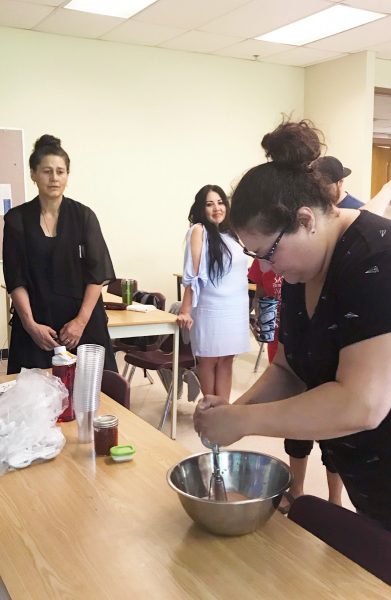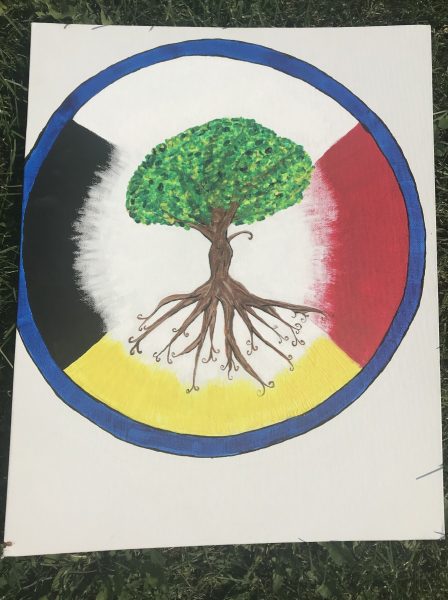In 2017, in response to the calls to action of the Truth and Reconciliation Commission, Thompson Rivers University initiated a two-year endeavour to transform the university by spreading Indigenous knowledge. It was called the Coyote Project, in acknowledgement of the coyote’s significance in Secwépemc culture—and it has made an impact campuswide. One powerful example: TRU’s Faculty of Education and Social Work (EDSW) has increased the number of Indigenous-focused courses it offers and revised several master’s level programs—and they are getting results.
EDSW set a goal to increase the enrolment of Indigenous students to 12.9 percent of its student population. After adjusting the curriculum, the faculty is seeing progress toward this goal.
“You might think this could take generations. But by creating more Indigenous-focused courses, having a speaker series and improving our faculty community collaboration, we are confident that we will close the gap and exceed it within the two years,” said Airini, dean of EDSW.
Launching new courses

High school teacher Serena Reves learns to make sxusem ice cream.
With that in mind, the School of Education developed master’s courses that reflect Indigenous learning and teaching, each led by an Indigenous faculty member, including:
- Shelly Johnson, chair for Indigenizing Higher Education, who leads Indigenous Research Methodologies (summer semester)
- Roxane Letterlough, lecturer for the School of Education, who leads place-based learning courses
- Rod McCormick, research chair for Aboriginal Health, who leads Indigenous Approaches to Counselling (winter semester)
“We saw a lot of excitement from Indigenous and non-Indigenous learners,” said Airini. “We’re all trying to learn the best way to live here within the Secwépemc Nation. I think these new courses help us all to learn about living with reconciliation and being responsive.”
Letterlough has helped increase the faculty’s responsiveness to Indigenous learners by teaching a pair of courses that deal with understanding where people come from and how we got to where we are today. Her Oral Traditions class has been available for a few semesters and is growing.
“We started with just five students, but it has really has taken off. We now take up to 20 students,” said Letterlough, who is St’át’imc from the Ts’ala’th Band.
The Oral Traditions class takes students deep into ancestral stories. The class listens to a variety of speakers each semester. The speakers often tell the same story and the students’ objectives are to understand how the same story can be told differently and gather lessons from each telling.
For their final exam, each student presents a traditional story to the class that encompasses the language, protocols and lessons they have learned.

High school teacher Serena Reves created this final project, titled Balance, for the Oral Traditions class.
Learning outside the classroom
Students are immersed in Secwépemc culture by getting out of the classroom—through Letterlough’s Learning from the Land class—and connecting with Mother Earth. In this condensed two-week seasonal class, students examine medicinal plants, canoe on Little Shuswap Lake and gather in circle to hear presentations outdoors, just as her ancestors did.
Letterlough’s programs are not only for Indigenous students; all are welcome to enrol.
“This class was probably the most effective class I’ve had that incorporated Indigenous knowledge,” said Robbi Davey, a master’s student in the School of Education.
With the Coyote Project, the EDSW is proud to be guided by the national Truth and Reconciliation Commission’s calls to action. By sharing instructors’ experiences, the faculty hope to gain promising practices and provide more students with access to new courses.
“The work we are doing is part of Canada coming to understand itself. We are contributing to a national endeavor,” said Airini.
In addition to building new curriculum, the program is also bringing in influential speakers to expand understanding.
“We have a lot of local, brilliant experts that can speak to our students. But we thought it was also important to bring in people from across Canada to offer insight and widen the Indigenous research community within TRU,” said Dr. Sereana Naepi, associate director, All My Relations Research Centre at TRU.
The program’s growth reflects TRU’s commitment to be the university of choice and opportunity for Indigenous peoples. The EDSW faculty’s commitment to this endeavor—and to developing their knowledge of Indigenous learning and teaching—will endure long past the Coyote Project.

